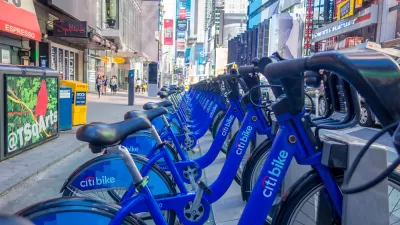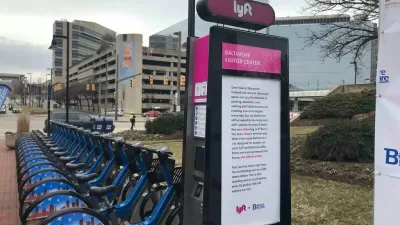As new transportation systems continue to emerge and gain popularity, the sacred cows of land use and transportation planning require radical new thinking, according to Gabe Klein.
Klein begins his argument about the need to rethink the paradigms of planning by citing the example of the disruptive possibility of bike share: "When we think about transit-oriented development, we typically think of rail stations. We know that in certain environments with density levels of X and height limits of Y, we can predict levels of investment of Z. But how would that equation hold up if Transit Oriented Development centered on a bike-share station, for instance, rather than rail stop?"
Autonomous vehicles and transportation network companies like Uber and Lyft could also disrupt traditional planning paradigms, because of their lack of a fixed node.
The evolution of the transportation system, to a larger, multi-mode, technology-enabled system will require bold action, according to Klein. "If we operate a bit fearlessly—and the public policy people work together with private industry and shape the rollout of technologies and services, as we have with bike-share in D.C. and Chicago—I think we will have a more ideal, equitable, and useful outcome for metro-area populations. The less we worry, and the more we implement these systems in different environments and at different levels of density, people will use them as they need them and show us the patterns....Then, cities can adjust offerings and move stations to fulfill constituent demand."
FULL STORY: We Need to Think Bigger About Transit-Oriented Development

Planetizen Federal Action Tracker
A weekly monitor of how Trump’s orders and actions are impacting planners and planning in America.

San Francisco's School District Spent $105M To Build Affordable Housing for Teachers — And That's Just the Beginning
SFUSD joins a growing list of school districts using their land holdings to address housing affordability challenges faced by their own employees.

The Tiny, Adorable $7,000 Car Turning Japan Onto EVs
The single seat Mibot charges from a regular plug as quickly as an iPad, and is about half the price of an average EV.

Seattle's Plan for Adopting Driverless Cars
Equity, safety, accessibility and affordability are front of mind as the city prepares for robotaxis and other autonomous vehicles.

As Trump Phases Out FEMA, Is It Time to Flee the Floodplains?
With less federal funding available for disaster relief efforts, the need to relocate at-risk communities is more urgent than ever.

With Protected Lanes, 460% More People Commute by Bike
For those needing more ammo, more data proving what we already knew is here.
Urban Design for Planners 1: Software Tools
This six-course series explores essential urban design concepts using open source software and equips planners with the tools they need to participate fully in the urban design process.
Planning for Universal Design
Learn the tools for implementing Universal Design in planning regulations.
Smith Gee Studio
City of Charlotte
City of Camden Redevelopment Agency
City of Astoria
Transportation Research & Education Center (TREC) at Portland State University
US High Speed Rail Association
City of Camden Redevelopment Agency
Municipality of Princeton (NJ)





























